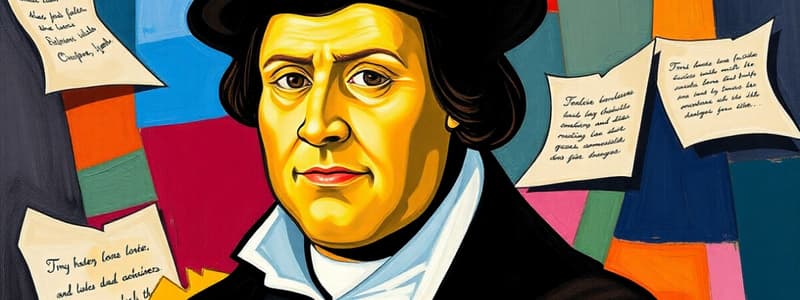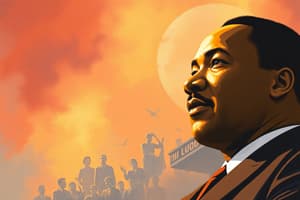Podcast
Questions and Answers
Spain was the weakest empire during the time period of its expansion.
Spain was the weakest empire during the time period of its expansion.
False (B)
Christopher Columbus's voyage to the Americas led to the establishment of new trade routes across the world.
Christopher Columbus's voyage to the Americas led to the establishment of new trade routes across the world.
True (A)
Humanism during the Renaissance prioritized eternal life over earthly values.
Humanism during the Renaissance prioritized eternal life over earthly values.
False (B)
The Atlantic Ocean was a significant area for new trade routes created by Spanish exploration.
The Atlantic Ocean was a significant area for new trade routes created by Spanish exploration.
New professions such as lawyers and doctors emerged as social and economic changes took place.
New professions such as lawyers and doctors emerged as social and economic changes took place.
Indulgences were sold during the Reformation as a way to grant salvation in exchange for money.
Indulgences were sold during the Reformation as a way to grant salvation in exchange for money.
Martin Luther believed that salvation could be achieved solely through good works.
Martin Luther believed that salvation could be achieved solely through good works.
The Counter-Reformation was initiated as a response to the political and social changes brought about by the Reformation.
The Counter-Reformation was initiated as a response to the political and social changes brought about by the Reformation.
Luther's expulsion from the church was celebrated by all religious factions of the time.
Luther's expulsion from the church was celebrated by all religious factions of the time.
Heresies during the Reformation reflected differing interpretations of established religious doctrine.
Heresies during the Reformation reflected differing interpretations of established religious doctrine.
Peasants were the primary food providers for all members of the society.
Peasants were the primary food providers for all members of the society.
Changing from one estate to another was a common occurrence in the society.
Changing from one estate to another was a common occurrence in the society.
Serfs had personal freedoms and property rights.
Serfs had personal freedoms and property rights.
Peasants in the medieval era often had a varied diet rich in nutrition.
Peasants in the medieval era often had a varied diet rich in nutrition.
Nobles acquired wealth by conquering territories and often hosted banquets.
Nobles acquired wealth by conquering territories and often hosted banquets.
The Bubonic Plague is estimated to have killed around 25 million people in Europe.
The Bubonic Plague is estimated to have killed around 25 million people in Europe.
Colonists had less independence compared to peasants.
Colonists had less independence compared to peasants.
Monarchs during the era faced little to no resistance from other groups within their realms.
Monarchs during the era faced little to no resistance from other groups within their realms.
The Black Death contributed to the decline of the feudal system by creating a labor shortage.
The Black Death contributed to the decline of the feudal system by creating a labor shortage.
Economic advancements during the medieval era resulted in decreased trade and interaction between regions in Europe.
Economic advancements during the medieval era resulted in decreased trade and interaction between regions in Europe.
The primary economic activity in feudalism was hunting.
The primary economic activity in feudalism was hunting.
A vassal could eventually consider the lands they managed as their own, leading to hereditary lordships.
A vassal could eventually consider the lands they managed as their own, leading to hereditary lordships.
Serfs worked the land for their own benefit without any obligations to a lord.
Serfs worked the land for their own benefit without any obligations to a lord.
Communal lands were exclusively owned by the lords and unavailable to the peasants.
Communal lands were exclusively owned by the lords and unavailable to the peasants.
In the feudal system, lords had the authority to impart justice and levy taxes on peasants.
In the feudal system, lords had the authority to impart justice and levy taxes on peasants.
Flashcards
Heresies
Heresies
Beliefs contrary to the established religious doctrines.
Indulgences
Indulgences
Religious pardons sold for money.
Luther's Salvation
Luther's Salvation
Salvation obtained through faith, not good deeds.
Counter-Reformation
Counter-Reformation
Signup and view all the flashcards
Political Impacts
Political Impacts
Signup and view all the flashcards
Spanish Empire's Power
Spanish Empire's Power
Signup and view all the flashcards
Columbus's Voyage
Columbus's Voyage
Signup and view all the flashcards
New Professions
New Professions
Signup and view all the flashcards
Humanism's Focus
Humanism's Focus
Signup and view all the flashcards
Renaissance Shift
Renaissance Shift
Signup and view all the flashcards
Estates of Society
Estates of Society
Signup and view all the flashcards
Noble's Role
Noble's Role
Signup and view all the flashcards
Peasant's Role
Peasant's Role
Signup and view all the flashcards
Serf's Freedom
Serf's Freedom
Signup and view all the flashcards
Castle Function
Castle Function
Signup and view all the flashcards
Medieval Estates
Medieval Estates
Signup and view all the flashcards
Peasant Life
Peasant Life
Signup and view all the flashcards
Feudalism's Impact
Feudalism's Impact
Signup and view all the flashcards
Bubonic Plague Impact
Bubonic Plague Impact
Signup and view all the flashcards
Absolute Monarchy Challenges
Absolute Monarchy Challenges
Signup and view all the flashcards
Feudal Society
Feudal Society
Signup and view all the flashcards
Lord's Estate
Lord's Estate
Signup and view all the flashcards
Serf
Serf
Signup and view all the flashcards
Estate System
Estate System
Signup and view all the flashcards
Manor System
Manor System
Signup and view all the flashcards
Study Notes
Heresies
- Heresies were positions or beliefs that challenged established doctrines
- Heresies often involved disagreements over teachings or practices
Sale of Indulgences
- The sale of indulgences was a significant source of income for the Church during the time
- This practice involved the granting of indulgences in exchange for money
Martin Luther
- Martin Luther was a German monk and professor of theology
- He was a significant figure in the Reformation
- Luther's ideas on salvation and the church led to a split in Christianity.
- He believed that salvation could be achieved only through faith in God, not through good works or the sale of indulgences
- This challenged the authority of the Catholic Church.
The Ninety-Five Theses
- The Ninety-Five Theses were a collection of 95 arguments written by Martin Luther
- The arguments were about the sale of indulgences
- They were posted on the door of the Wittenberg church in 1517
- These works sparked the Protestant Reformation
Studying That Suits You
Use AI to generate personalized quizzes and flashcards to suit your learning preferences.




